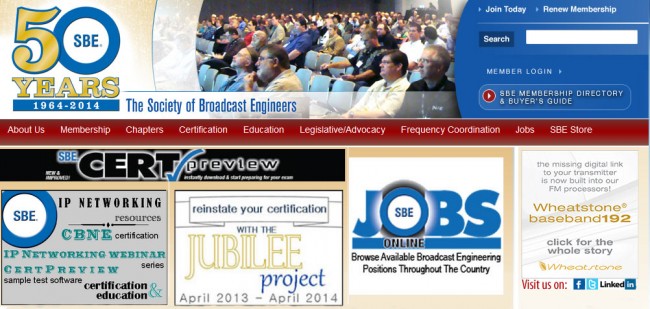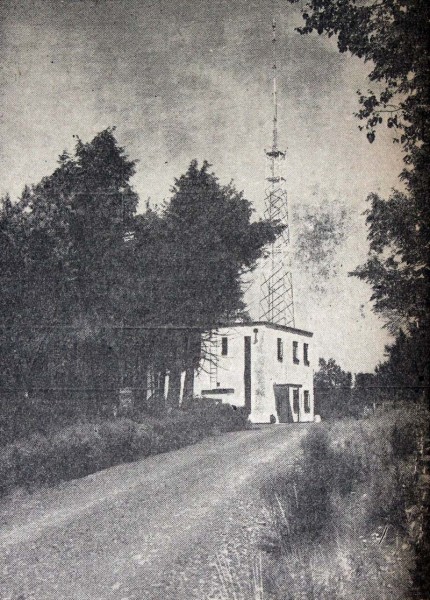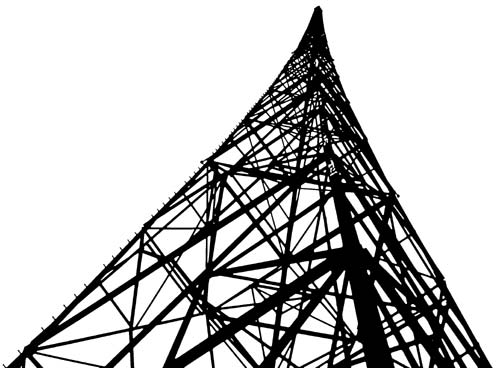Update and bump: The many great comments about the SBE certifications got me thinking about what a Broadcast Engineer actually does. I remember typing something about it quite some time ago, thus, I dredged up this old post originally from August 8, 2009 out of the archive.
Enjoy:
The other day, the NTR (Non-Traditional Revenue) person came to me and said “Great news! We hired a new web guy, he knows all about engineering too!”
Really?
So I spoke to the new Web Master/Broadcast Engineer for a bit. As it turns out, he knows how to do things like reboot the XDS satellite receiver, and reboot an Audiovault server, he has been to a transmitter site a few times to take meter readings. I suppose these days, that is what counts as being a broadcast engineer. Someone with this level of experience could get by for a bit until something really bad happened.
Sadly, I think (my former employer) upper management and ownership believe that this guy could do my (old) job. To them, I am an employee number, with a salary and benefits package worth X. If they can replace me with someone that makes <X, that would represent savings. Plug that guy into this spot, everything will go on as it did before.
I don’t think they understand exactly what a Broadcast Engineer does. On any given day, I may:
- Program an automated computer
- Change the battery on a backup generator
- Change the battery bank in an 18 KVA UPS
- Clean a transmitter
- Aim a satellite dish
- Troubleshoot a DS-1 Circuit
- Troubleshoot a T-1 MUX
- Repair a microwave transmitter or receiver
- Take a set of monitor points
- Repair a tower light flasher circuit
- Install a console (analog, digital, IP routing, TDM routing)
- Repair a CD player
- Troubleshoot a transmitter RF module
- PM a generator
- Work with a tower crew to place an antenna on a tower
- Install an RF connector on 3-inch transmission line
- Wire an air conditioning unit at a transmitter site
- Repair lightning-damaged ATU
- Troubleshoot an AC unit
- Aim an STL antenna
- Repair an RPU transmitter
- Design a computer network
- Troubleshoot and repair an FM transmitter
- Wire a new rack room
- Coordinate a complex format change
- Install a translator
- Program and wire a new satellite receiver
- Wire a transmitter remote control
- Hike to a transmitter site after a natural disaster
- Troubleshoot an audio hum
- Pass an FCC inspection
- Install and program an EAS unit
- Wire a new studio
- Design a tower light monitor circuit
- Fix a studio phone system
- Install an audio router
- Match an AM transmitter to a new tower
- Wire an ethernet patch panel
- Program a wireless access point
- Install an IP router
- Manage a new tower project
- Install a new transmitter
- Re-install an old transmitter
- Make NRSC measurements on an AM transmitter
- Repair a corrupt OS
- Replace a hard drive
- Reboot a server
- Fix a reel-to-reel machine
- Install a computer program
- Clean a console
- Pass an inspection by the fire marshal
To name a few. In other words, there are a lot of complex systems at a multi-station radio facility. Some of this can be learned at various schools and colleges. A lot of it is experience. There is no substitute for an experienced veteran broadcaster who has seen almost everything and can think on his or her feet.
I have had this discussion with the market manager, and he gets it. I know that he understands and knows more about the ins and outs of all of our studio and transmitter sites. Things like, where is the water shutoff, the handle is broken off of the toilet on the second floor. Of course, I know it is downstairs in the furnace room next to the fire sprinkler system.
I know where the skeletons are buried. I have the inside numbers for the utility companies and the phone company. I know the code enforcement officer for most of the municipalities where we own buildings and property.
Yet, the only thing they see is X.







I know of several colleagues who were “downsized” as upper management saw them as nothing more than a number. I myself had worked at several stations while maintaining another full-time position as it was quite evident they never realized the value of the talent a professional broadcast engineer brings to the table. The larger groups who no longer maintain their own on-staff engineers are bound to learn from their mistake, be it with added downtime of their on-air signals or major inconveniences and other incidental equipment failures thanks to management attempting to squeeze every last penny out of an operation.
See, I’m not that old (36) but I stared working in radio when I was 15 and sense evolved to be unemployed. Funny. I don’t know how to fix a “18 KVA UPS” or an old crt tv but I know the rest. I know how to solder and even read and understand manual in a language that is not my.
So I think the issue here is what the paper say about you. The employer need to read. The web guy it’s a lucky moron. For all I care he might know how to ensemble raid of disk and configured. But the employer needs to trust that dude with stuff that cost more than a car.
I think that even if the employer knows the risk he will end up hiring someone with “attitude”, regales of aptitude to cut cost. Most of the times.
The employer hired someone that knows something that he no longer wants or cares to get or understand. For the rest… he probably knows a “guy”.
It’s like hiring a secretary to handle your new cellphone. Oh, now I get it. That’s why they’re so young.
Paper Good. Good luck.
I recently lost a long term contract. The new owner found some younger schmuck who can work on her aged (13 yrs) Nextgen system and who works cheaper than I do. She thought she had hit the jackpot so she cancelled our contract without regard for everything ELSE I do. All was good until a couple of weeks later when one of her FMs went off. And stayed off. 8+ hours. I learned later that nobody knew where the transmitter was and once they found it, it was the first time the young turk had seen a transmitter….much less a tube transmitter. See, she cancelled our contract BEFORE I had a chance to show the new dude where everything was. Springtime should be interesting since she has an AM that is a lightning magnet and getting the stand by MW1A isn’t as simple as just throwing a switch.
Paul,
One more job description to include…… Wildlife Manager ! For example, deceased snake coiled around a HV rectifier stack, mice condominiums in the ATU, wasp subdivisions in the generator housing and of course the racoon family frolicking in the attic of the transmitter building.
I’ve had them all and I bet you have too !
Hahaha! Wildlife manager! You mean getting the snakes out of the ATU? Trying to get rid of the groundhog that keeps digging near the buried transmission line? That one is like Caddyshack. No matter what I do the *#&^ keeps coming back.
Oh, and getting the dumb deer that got stuck inside the tower fence back outside and shuffling the cows around so I can take base current readings. Forgot about those too.
I would add basic carpentry to the list of duties.
Please don’t think for a second that the situation is any different in Europe.
Fuel for the generators,where are they? The exec. know it all to the customer practically peed him or her self when I fired up the lights and I hit the switch that started 3 900 AMP turbo charged generators and lots of huge contactors locking and loading ,I love shock value, a very teachable moment!
They were already deaf by the time they got to the multiple squeeling UPS units.
KPI’s are delivered at the grass roots level,not at the conference table,buy em’ a clue when you can.
Where’s the “like” button for this post? 🙂
I’m a unix admin by trade, but really I see so many parallels here – I’m a dying breed (jack of all trades and all that – now everyone just wants “DevOps” people), the people coming up have very narrow knowledge bases, and the whole “24/7/365” concept is mostly an unknown. And forget about process and procedure because “Bob the Developer” has the server “running” and if it’s running, well, that’s the goal, right?
Funniest though is someone saying “we hired a web guy” probably strikes the same amount of fear/terror into both of our hearts. Such a red flag.
I will stop typing now to avoid creating a 12 paragraph comment. I will drop a few tidbits before leaving:
* I’ve recently been considering getting an EE degree, no clue where or what that entails these days, I’m more interested in audio and RF than anything else.
* Since finding this blog the other day, I’ve been slowly making my way through old posts, I’m back to early 2011 as of today.
* This is all great writing. I saw a post yesterday that helped me really grasp ground loops for the first time. A career in technical writing or journalism seems like it wouldn’t be much of a stretch for you.
* I think we diverge in some ways politically, but on the whole, I love where you’re coming from and I love that you’re not some easily-pigeonholed caricature. Keyword: grey.
@Marcos, 18,000 VA (Watt, sort of) Uninteruptable Power Supply
@Bill/Nick, you mean like the snake found in the bottom of a transmitter pictured in this post: https://www.engineeringradio.us/blog/2011/08/the-harris-sx-5/
@Chas, I am a pretty free thinker and quite frankly would be surprised if somebody agreed with all of my political views. Thank you for the props on technical writing, it is something that I enjoy 🙂
Paul, you’re a true professional. I was honored to learn under you for about a year and kick myself for not sticking around longer. The level of intelligence you offer in the broadcast engineer space is unmatched. We had some good laughs but when it was time to work, we worked! PS – Hope the wind and solar power worked out in the long run.
Daniel San! Nice to hear from you! We did indeed have some laughs and it was great working with you!